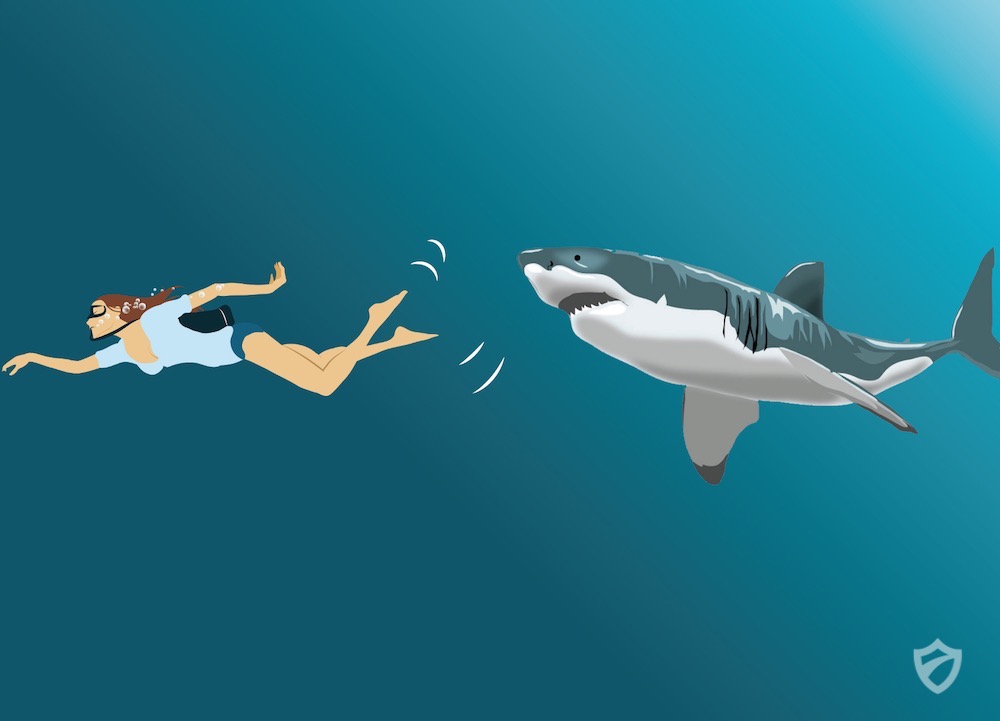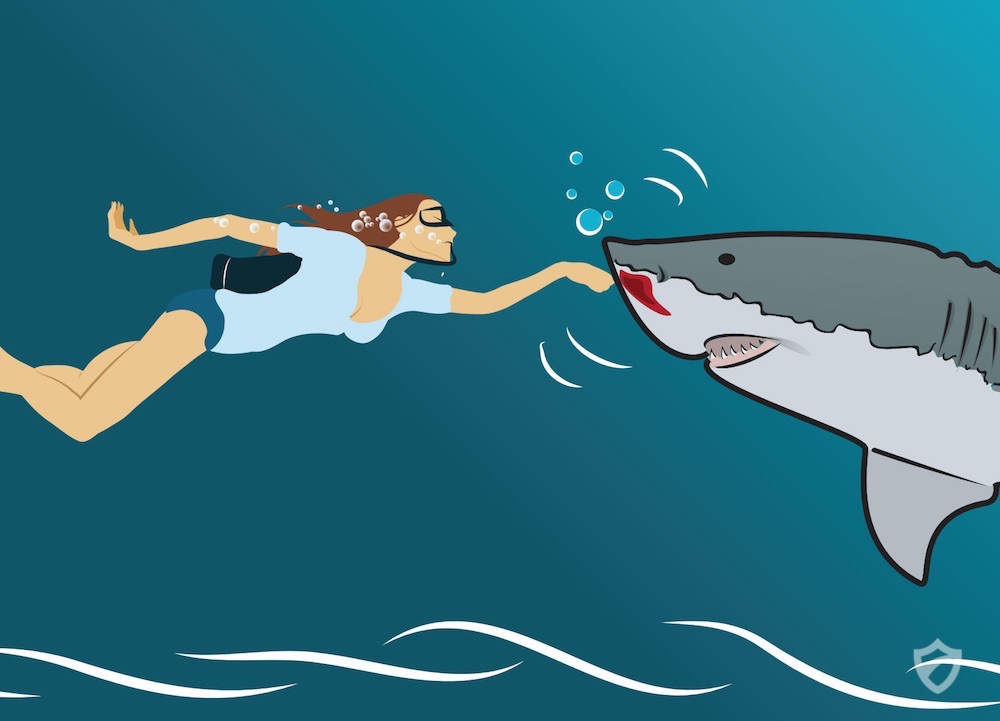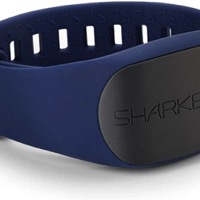10 Things You Should Know About Shark Attacks
Top tips on sharks - including How to Avoid Them!

By Jess Simmonds, Expert Reviewer for Repellent Guide
published: Feb 05, 2018 | updated: Feb 08, 2018
Shark attacks are every beach lovers worst nightmare, and often fill the headlines whenever they occur. What should you actually do in the case of an attack?
It seems like sharks have been taking over the media lately (and we're not just talking about the kind that swirl around in tornadoes on the SyFy Channel.) Shark attacks have been showing up on our social media feeds almost like clockwork, and the videos of surfer Mick Fanning's recent great white shark encounter are definitely trending.
With the media telling us that shark attacks are on the rise, many people are avoiding the beach altogether. But the media is known for sensationalizing stories, right?
We decided to find out more about the shark situation from a real expert: George H. Burgess, director of the Florida Program for Shark Research at the Florida Museum of Natural History. With his insight, facts from the museum's website, and lots of research, we've compiled the following list of shark attack must-knows:
Sharks swim faster then you
If a shark does attack - you can't out-swim a shark, so unless you're very close to shore or a boat, don't try to flee. Better to swim calmly while keep an eye on the sharks location so if it does attack you can try to defend yourself.

Don't play dead!
Don't play dead as it won't stop sharks coming back for another bite. That doesn't work on aggressive sharks. Also, don't thrash about, because that can rile the shark up for the attack. Your best bet is to stay calm and move slowly.

Sharks can't take a punch!
Sharks might not have glass jaws, but they can't take a punch nonetheless. Maintain a defensive position by keeping your eyes on the shark (they like to sneak up behind you for the attack) and readying yourself to fight back.
 If the shark makes his move, punch him in the face. Seriously. You want to aim for the gills, eyes, and the tip of its snout (these are the only weak points on a shark's body.) Usually, a solid strike to these areas will cause the shark to retreat. Use your fists if that's all you have, but a spear gun, pole, or even a glass bottle will give you a much-needed edge.
If the shark makes his move, punch him in the face. Seriously. You want to aim for the gills, eyes, and the tip of its snout (these are the only weak points on a shark's body.) Usually, a solid strike to these areas will cause the shark to retreat. Use your fists if that's all you have, but a spear gun, pole, or even a glass bottle will give you a much-needed edge.Some sharks spoil it for everybody
There are over 440 known species of shark. While that might seem like a lot of teeth swimming around out there, the truth is that most of these 440-plus species want nothing to do with human-flavored food. The vast majority of shark attacks against humans are carried out by four species: the bull shark, the tiger shark, the oceanic whitetip shark, and the great white shark.
Attacks are increasing (slowly)
Unprovoked shark attacks are slowly increasing, but they're not on the rise. George H. Burgess curates the International Shark Attack File, so if anyone were to notice a terrifying increase in shark aggression, it would be him. The fact that Burgess isn't running around yelling you have to close the beaches! should be a good sign from the get-go. We all know that the media loves attention, so they're usually quick to say that dangerous things are on the rise. This makes us imagine huge gangs of sharks forming up on the coastlines, just waiting to take down the human race. The truth of the matter, according to Burgess, is far less frightening. We're the reason behind the slowly growing rate of unprovoked shark attacks; it's not the sharks' fault. Simply put, as the human population grows, more of us go to the beach, snorkel, surf, and do things that generally put us in a position where a shark might mistake us for a meal. It's not really the odds of a shark attack that changed it's the number of people taking the gamble.
Feeling lucky?
Your chances of being attacked by a shark are pretty low. Speaking of taking the gamble, you'll be happy to know that you're odds of being attacked by a shark are really, really low. In fact, if you're in Florida (the shark attack epicenter of the U.S.), you have a better chance of being killed by an alligator than a shark. Heck, you have a better chance of succumbing to a lethal injury from riding your bike to the beach than you do of becoming a shark amuse-bouche. (Burgess: 15,000 people died while cycling between 1990 and 2009. During that period, only 14 people died from shark attacks). And what about the gold standard of odds calculation? Yes, you're more likely to be hit by lightning than to be bitten by a shark.
Most shark attacks aren't fatal
Even if you were to be attacked by a shark, the odds of surviving are in your favor. According the Florida Museum of Natural History's A Comparison of Unprovoked Shark Attacks with the Number of Lightning Fatalities in Coastal United States: 1959-2010, only 26 of the 974 shark attacks recorded during that time period resulted in a fatality.
Human smarts > hungry sharks
Man's future relationship with sharks isn't up to them; it's up to us, says Burgess. We are eco-visitors to their homes. Changes in the status quo will have to be made on the human side rather than the shark side. Always remember: They have bigger teeth, but we have bigger brains. Avoiding shark encounters is really our responsibility, as we're the ones encroaching into the habitat of the shark. Sometimes it's easy to forget that the danger is there, but that's no excuse; when you're swimming out into the territory of something that's been called the world's most perfect killing machine, some caution and common sense is probably a good idea.
Drones to the rescue!
Authorities are fighting shark attacks with drones. Back in May of 2015, lifeguards on Seal Beach (in Orange County, CA) began using drones to search for sharks. "We were looking for a better way to identify the length, and what type of shark, and where they were, so we thought a drone might be useful," Chief Joe Bailey, a Seal Beach lifeguard, told NBC News. The experiment was a success, and lifeguards have been able to spot dozens of sharks from above. It's a step in the right direction, but some believe that the technology just isn't there yet, as most drones can only stay in the air for 15-20 minutes at a time.
Keep away from Fishermen
One of the simplest and most effective steps to avoiding a shark attack is... ...don't swim anywhere near fishermen. Sharks are attracted to bait fish, as well as the excitement that those bait fish can stir up in the water. Although authorities should be the ones separating fishermen from swimmers, not every beach is patrolled or posted. In those cases, make the smart judgement call yourself and swim far away from angling.
-
Magnetic Band
-
Non-Magnetic Band
-
Crystals




